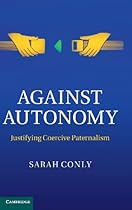Against Autonomy: Justifying Coercive Paternalism

| Author | : | |
| Rating | : | 4.37 (994 Votes) |
| Asin | : | 1107024846 |
| Format Type | : | paperback |
| Number of Pages | : | 216 Pages |
| Publish Date | : | 2016-06-07 |
| Language | : | English |
DESCRIPTION:
"For Authoritarianism, keeping the dream of "198For Authoritarianism, keeping the dream of "1984" alive Brian Massie Ever been at an expensive restaurant and wind up choking down an awful meal because you paid so much for it? That's what this book was like for me. "For Authoritarianism" would have been a more appropriate title, and that's what Conly suggests is best for everyone. Just so we're on the same page with respect to the use of the word, autonomy is the ability to make choices . " alive" according to Brian Massie. Ever been at an expensive restaurant and wind up choking down an awful meal because you paid so much for it? That's what this book was like for me. "For Authoritarianism" would have been a more appropriate title, and that's what Conly suggests is best for everyone. Just so we're on the same page with respect to the use of the word, autonomy is the ability to make choices . Kevin Currie-Knight said I Remain Unconvinced. (Here's Why.). First, despite my disagreement with the book, I am glad Sarah Conly has written it. Philosophy thrives on people's willingness to make controversial cases that can spur good dialogue. This book is a well-articulated (even if philosophically problematic) argument for 'coercive paternalism' by government - the ability of government to coerce us in cases where (one could arg. Conly would recommend very few coercively paternalistic policies -- possible fewer than Nick Byrd Sara Conly responds to almost all of the complaints in the reviews that are posted as I write this. Her view is not totalitarianism. Her view is also not elitist. And it is not undemocratic. The reality is, that even Conly's proposal were enacted, it might actually result in LESS policies, overall, than we currently have (in the US). A careful reading of Conly's book show
Tough-minded, resourceful, precise, and informed by knowledge of both psychology and the regulatory state, the book issues a challenge to which, from now on, anyone who objects to paternalistic government policies will have to respond. In this lively, accessible, sensible, and well argued book, Conly makes a case for coercive paternalism that critics of the 'nanny state' will have to take seriously." Alan Wertheimer, Professor Emeritus, University of Vermont" careful, provocative, and novel, and it is a fundamental challenge to Mill and the many people who follow him " Cass R. Taylor, The College of New Jersey, Choice" a concise and coher
. Sarah Conly is Assistant Professor of Philosophy at Bowdoin College, Brunswick, Maine
Indeed, to respect autonomy is often understood to be the chief way to bear witness to the intrinsic value of persons. In this book, Sarah Conly rejects the idea of autonomy as inviolable. Thus in many cases it would advance our goals more effectively if government were to prevent us from acting in accordance with our decisions. Drawing on sources from behavioural economics and social psychology, she argues that we are so often irrational in making our decisions that our autonomous choices often undercut the achievement of our own goals. Her argument challenges widely held views of moral agency, democratic values and the public/private distinction, and will interest readers in ethics, political philosophy, political theory and philosophy of law.. Since Mill's seminal work On Liberty, philosophers and political theorists have accepted that we should respect the decisions of individual agents when those decisions affect no one other than themselves
